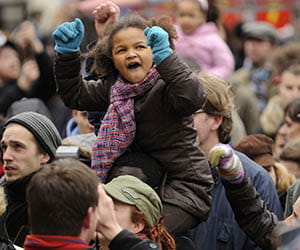By Dr. Ward Ulmer, Interim President of Walden University

I have four kids, and I love them all dearly. My wife and I have worked hard to raise them in a values-driven home focusing on kindness, inclusivity, and decency. As they’ve grown, we have seen these virtues in the choices they make at home and school and in the community. To call us proud parents would be an understatement.
Lately, our older boys have become increasingly interested in social issues. When one of their favorite brands took a stand, they shared with us how angry they were. It sparked a healthy dialogue about their feelings, the issue at hand, and what they wanted to do about it. Being teenagers, they moved past that issue and into what was trending next in the news.
As they age, they may become less inclined to move on so quickly. Instead, they might want to invest their time, energy, and resources into something they sincerely support. This made me wonder if our kids—mine and yours—are empowered to truly have a voice. Do we as parents box our kids in to our beliefs? When is it OK for a child to do something to make a difference when it’s not the view of his or her parent?
Though as parents we are role models, it can be hard to admit that our children may actually look beyond the household for inspiration and guidance. But who do they see? It’s most likely millennials, the generation comprising a massive group of individuals who actively seek to change the world.
Scores of studies and articles have been conducted and written about millennials. Gallup has studied how they want to work and live. The U.S. Bureau of Labor Statistics compiled fun facts about their spending habits. They’re the largest generation in the U.S. labor workforce and stand out for their technology use, according to the Pew Research Center. Another defining characteristic is that they are increasingly committed to working for a purpose, not a paycheck. These are our kids’ role models.
“It’s important to expose young children to not just social issues but the good work people are doing to improve the lives of others,” says Molly Raymond, a millennial from Minneapolis who supports our students as an MSW field education coordinator. Prior to joining Walden, she was a community organizer and cofounder of a nonprofit organization focused on empowering youth to make a difference in a wide array of social issues.
“Focusing on meaning and purpose can help empower youth to have a voice,” adds Raymond.
For example, her organization would partner with existing school programs and ask kids ages 5–21 what’s important to them and what they would like to change in the world. Topics of interest varied greatly and included LGBT issues, homelessness, and interracial marriage.
Raymond admits, “We would never have been able to come up with these issues on our own because we didn’t know what they cared about.”
Next, Raymond and her team would pull together a list of people working on these issues and bring them in to speak with students, providing insights and resources that support those efforts. The students would then create an art project to help tell the stories of these social change agents and the people they’re impacting. The art projects were unveiled at local events that brought parents and other community members together for the greater good.
Becoming a parent comes with incredible responsibility, but I believe it’s an opportunity. Empowering youth to discover what is meaningful to them—even if it’s different from what is meaningful to us—is a critical step in laying the foundation for them to have a voice. We must prepare them to be critical thinkers about the world around them and teach them how to engage with others. And we should enable them to gain the skills and experience to research, present, and debate their ideas in a respectful way.
It’s important that every person has a chance to use their voice to effect positive social change, especially youth struggling in underserved communities. Giving up is not an option, says Dr. Lovely Thornton. The Walden PhD in Education graduate is a college professor and the founder of the Sensible Women Initiative, which assists ladies ages 5 to 25 with developing professional skills and decision-making abilities.
“I know how much work it takes to guide kids, including those who are angry and making bad decisions,” says Dr. Thornton. “They are also smart and need to learn how to harness that energy for something good. It’s amazing the impact you can have on young people’s lives. Many of my girls have seen the positive impact of mentoring and have gone on to become teachers and other public officials who are changing the lives of so many others.”
I have no doubt we will see more youth standing outside of city halls and courthouses, and just maybe their voices will be the loudest. I truly hope they are successful in effecting positive social change, even if their way of doing it is different from how my parents did it.



